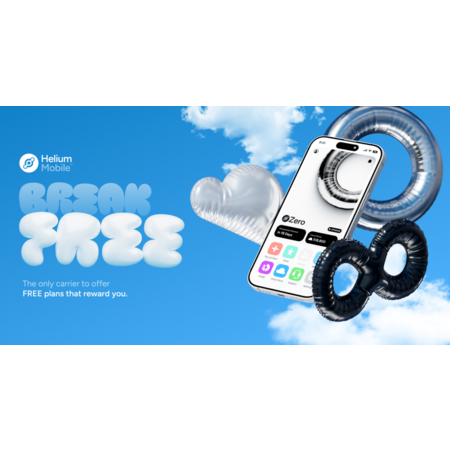Helium Mobile has
Helium Mobile Zero Plan w/ 100 Minutes Talk, 300 Texts & 3GB of Data (per month) for
Free when you
Bring Your Own Device and follow the instructions below by using code
BREAKFREE at signup.
Thanks to community member
WackyP for finding this deal.
Deal Instructions:
- An unlocked T-Mobile-compatible device is required.
- Download the Helium Mobile app (Android / iOS)
- Open the app and when prompted, enter invite-only code BREAKFREE
- Proceed through the setup process by proving the following details:
- Valid email address
- Your name, home address and date of birth
- Complete the identity security check using a valid government-issued ID (i.e. a driver's license) and taking a 'selfie' photo.
- No credit card or other payment info is required for this free plan.
- You may select eSIM or physical SIM card activation (SIM card ships free).
- Your monthly Zero Plan w/ 100 talk minutes, 300 texts and 3GB of data will be Free
How is Helium Mobile able to offer a free phone plan? (
source)
- "Helium Mobile's free plan is made possible with its community-built network, a new type of infrastructure that is less expensive than legacy carriers. In exchange for the free plan, you'll share your anonymized location data, enabling the community to create coverage where it's most needed."
Plan Features (per month):
- 100 minutes talk
- 300 texts
- 3GB of high-speed data (4G LTE/5G)
- Note: hotspot data is not available on the free Zero plan.
- No credit card needed
- You may port your existing number to Helium Mobile if desired
- Earn Rewards with Cloud Points
- Redeem points for gift cards to travel, dining, and other experiences.
- Helium Mobile operates on the T-Mobile network



Leave a Comment
Top Comments
If you think I'm joking, check your own current paid ISP plan's terms of service. Non-trivial probability they're already doing similar to you, at least if you're not protected by something like the EU's GDPR.
Is that what's going on here, or is their business model different somehow?
Anyways...So they will pay you in their crypto token., Which they then accept as payment.Or you can sell yourself. Im assuming they are going to expand on this somehow.
Also a while back they were talking about another app that carriers were going to opt into that allows people to use each others phones a a hotspot for a small fee.
Just a guess but maybe something with this as well.
They are not the only company going this way there are going to be some announcements very soon of others going this path
662 Comments
Sign up for a Slickdeals account to remove this ad.
Our community has rated this post as helpful. If you agree, why not thank serg499
Our community has rated this post as helpful. If you agree, why not thank booda3000
Our community has rated this post as helpful. If you agree, why not thank Satoshi_N
No complaints
Our community has rated this post as helpful. If you agree, why not thank JediNick23
If you think I'm joking, check your own current paid ISP plan's terms of service. Non-trivial probability they're already doing similar to you, at least if you're not protected by something like the EU's GDPR.
Is that what's going on here, or is their business model different somehow?
Our community has rated this post as helpful. If you agree, why not thank laidbackinNC
Our community has rated this post as helpful. If you agree, why not thank Satoshi_N
Is that what's going on here, or is their business model different somehow?
Anyways...So they will pay you in their crypto token., Which they then accept as payment.Or you can sell yourself. Im assuming they are going to expand on this somehow.
Also a while back they were talking about another app that carriers were going to opt into that allows people to use each others phones a a hotspot for a small fee.
Just a guess but maybe something with this as well.
They are not the only company going this way there are going to be some announcements very soon of others going this path
Sign up for a Slickdeals account to remove this ad.
Our community has rated this post as helpful. If you agree, why not thank rentvent
Our community has rated this post as helpful. If you agree, why not thank Satoshi_N
Our community has rated this post as helpful. If you agree, why not thank lizard5102
If you think I'm joking, check your own current paid ISP plan's terms of service. Non-trivial probability they're already doing similar to you, at least if you're not protected by something like the EU's GDPR.
Is that what's going on here, or is their business model different somehow?
I ask because I already do that to block ads/tracking using AdGuardHome DNS server running locally on my network. I have set my Android Private DNS under settings -> Network & Internet to use that all the time via DoT (DNS over TLS); so I never use the ISP DNS at all. My home router is set to use that as the DNS server (so all devices on my local network, including TVs, go through that). I have also configured all Google Home / Nest devices at home to not use GoogleDNS in the app settings.
I know 99.9% of the people will not go to this length, but curious if that atleast reduces the concern of your data being used for something like this. Eventually I understand that the ISP can sniff anyway, but most websites today use HTTPS and TLS, so nearly everything is encrypted to the point where that sniffing will be not-so-useful for the ISP.
So really, the most useful data is location information that they can easily get by triangulating towers; and I admit that would still be very valuable data to sell.
I ask because I already do that to block ads/tracking using AdGuardHome DNS server running locally on my network. I have set my Android Private DNS under settings -> Network & Internet to use that all the time via DoT (DNS over TLS); so I never use the ISP DNS at all. My home router is set to use that as the DNS server (so all devices on my local network, including TVs, go through that). I have also configured all Google Home / Nest devices at home to not use GoogleDNS in the app settings.
I know 99.9% of the people will not go to this length, but curious if that atleast reduces the concern of your data being used for something like this. Eventually I understand that the ISP can sniff anyway, but most websites today use HTTPS and TLS, so nearly everything is encrypted to the point where that sniffing will be not-so-useful for the ISP.
So really, the most useful data is location information that they can easily get by triangulating towers; and I admit that would still be very valuable data to sell.
Our community has rated this post as helpful. If you agree, why not thank Satoshi_N
I ask because I already do that to block ads/tracking using AdGuardHome DNS server running locally on my network. I have set my Android Private DNS under settings -> Network & Internet to use that all the time via DoT (DNS over TLS); so I never use the ISP DNS at all. My home router is set to use that as the DNS server (so all devices on my local network, including TVs, go through that). I have also configured all Google Home / Nest devices at home to not use GoogleDNS in the app settings.
I know 99.9% of the people will not go to this length, but curious if that atleast reduces the concern of your data being used for something like this. Eventually I understand that the ISP can sniff anyway, but most websites today use HTTPS and TLS, so nearly everything is encrypted to the point where that sniffing will be not-so-useful for the ISP.
So really, the most useful data is location information that they can easily get by triangulating towers; and I admit that would still be very valuable data to sell.
Our community has rated this post as helpful. If you agree, why not thank oasisallure
big 3 too expensive
Sign up for a Slickdeals account to remove this ad.
Leave a Comment